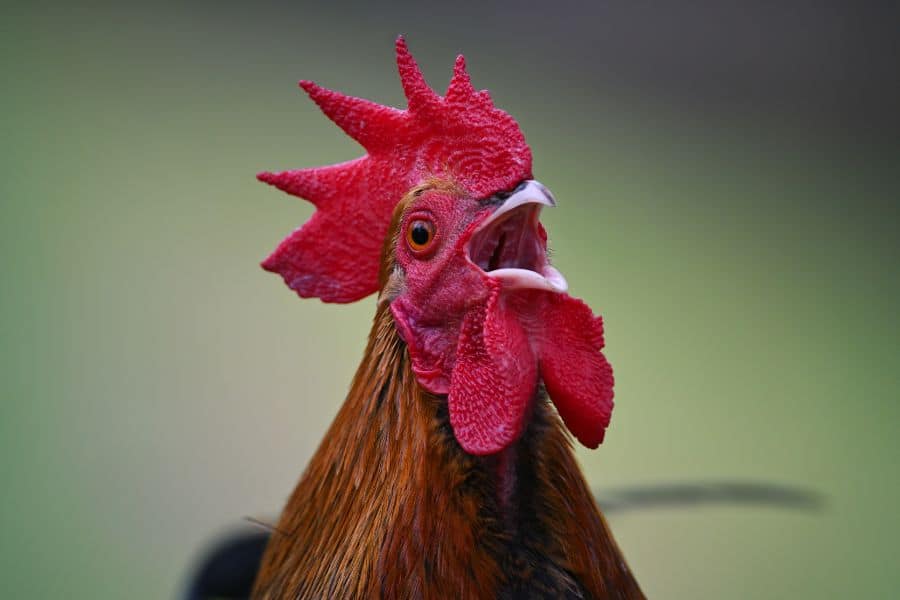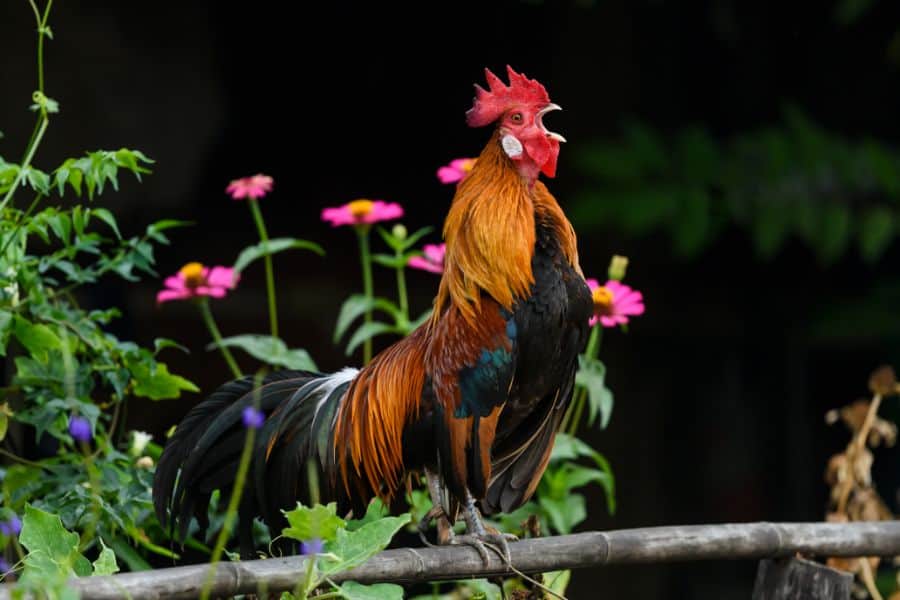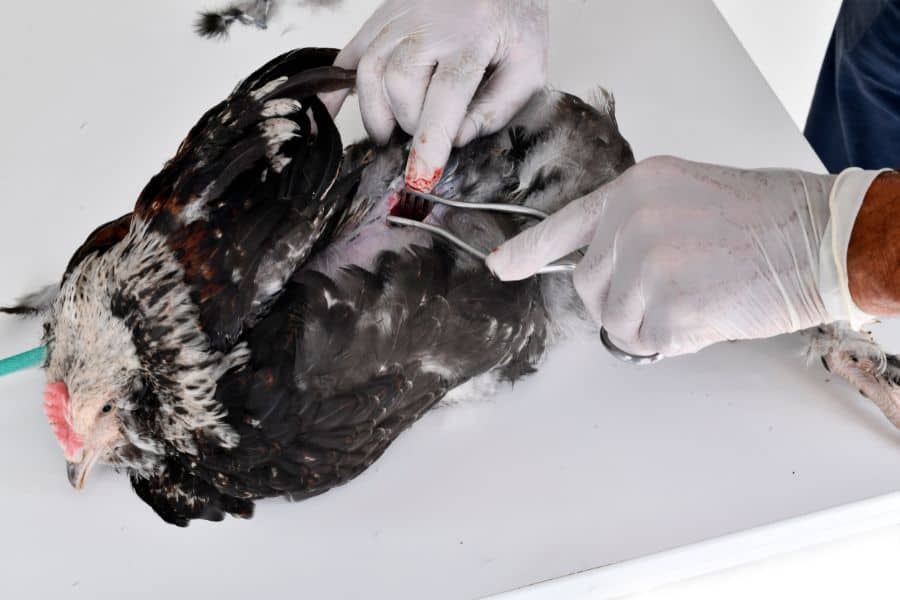Are your rooster’s crows at the crack of dawn becoming a nuisance?
You’re not alone.
Cockerels can get really annoying – to say the least – with their loud vocalizations, and it gets even worse if residing in urban or suburban areas.
But don’t worry.
In this blog post, we have curated some invaluable tips to save you from those early-morning and all-day-long serenades from your roo. So, if that’s what you’re looking for, you’re in for a treat!
Why Roosters Crow All Day

Perhaps you’ve heard roosters make their signature sound early in the morning and wondered why they do it.
Well, it’s because, like all other animals, roosters have a circadian rhythm, an internal process that regulates their daily cycle’s biological activity based on a 24-hour period.
In simpler terms, roosters have an internal clock that helps them know what time it is and when to make the dawn alert.
“That’s on early morning crow…but my rooster does it all day long …”, you might be wondering.
Well, it’s simple!
Although the internal clock is more often responsible for the early morning cock-a-doodle-doo, it isn’t the only reason cockerels crow, which is why your rooster does it any time of the day.
Sometimes roosters crow to attract mates, express their emotions, establish territory, communicate with the flock, etc.
Can I Make My Rooster Stop Crowing?
We’ve got a thousand and one perks of having a rooster as part of the flock.
But let’s be honest – even with all the benefits they offer, roosters can be annoying, especially with their early-morning wake-up call.
That leaves most of us wondering if there is anything we can do to bring the crow to an end.
Unfortunately, no one has successfully invented a way to keep roosters from crowing.
But with the hacks below, you can make your rooster’s vocalizations less of a problem without having to transform your bird into a tasty meal.
9 Things To Do To Manage Your Rooster’s Crowing
If you’re getting to your wits’ end with your rooster’s crowing, here are some tricks you can try to manage their crowing.
Meet Their Basic Needs
Like other animals kept at home, roosters have their way of communicating. In fact, some of the crows they make during the day could carry a message that needs your intervention.
A case in point is when the flock has run out of food or water. In such a case, the roo will use the crow to get your attention.
To minimize the crowing and make your home more peaceful, replenish your chicken’s food and water containers before they run out. It will avoid any crowing that could otherwise emanate from the lack of either of the two.
Reduce Competition
If you have two, three, or more roosters in the same flock, it’s likely one of the reasons you keep getting those loud crows.
That’s because, while roosters will have a well-established hierarchy, it’s not only the dominant roo that sounds. The leader will crow first to announce power, and the other roosters will follow suit in the order of the hierarchy.
That means once the leader rooster makes the first crow, the next rooster to sound will be the second in the pecking order. It will then be followed by the third, fourth, and fifth cockerels in the hierarchy.
That’s to say, the more roosters you have in your flock, the more the number of crows you should expect. On average, a rooster will crow 12 to 15 times per day!
Check for Predators
As the flock leader, a rooster has a protective instinct and will always want to ensure the security of other chickens. The male will watch for danger and communicate with the group when he notices any predator or threat approaching.
If your rooster is becoming too chatty, he could be using it to alert the rest of the population of imminent danger. It could be a giant snake, a predator bird, or another threat.
So, before you get annoyed that your rooster’s noise is becoming too much, check to see if your intervention could be needed.
Usually, a danger alert differs from the regular crow your bird makes with his neck stretched out. In the event of danger, the rooster will use a repetitive clucking sound that will get faster and more persistent as the threat gets closer.
Below is a Youtube video to help you understand what a rooster’s danger alert sounds like:
Switch To Low Cages
When crowing, roosters must stretch their necks for them to project their call. If your roo’s crows are becoming louder than you’re willing to tolerate, one of the things you can do to minimize them is to use low cages.
A low cage denies a rooster enough room to stretch out his neck, keeping him from crowing in the first place.
But then, remember that low cages are uncomfortable. In fact, keeping your rooster in them for extended periods would be inhumane.
As such, if you must use this technique, only make it an overnight thing and get your rooster from the enclosure in the morning. It will help you avoid early crows without torturing your bird.
Conditioning
Most people associate conditioning with dogs. But did you know you can also use conditioning to modify your rooster’s crowing behavior if it’s becoming a nuisance to you?
That’s right!
In the same way you can alter a dog’s barking behavior, you can use conditioning to keep your chatty rooster from crowing.
In fact, recent studies even suggest that some chickens are more intelligent than dogs. That’s to say; you should find conditioning your feathery friend easier than your furry friend.
Conditioning won’t completely stop the crowing, but it can make it less frequent and, thus, more bearable.
Use a reward system to establish and reinforce the desired behavior. That’s to say, if your rooster behaves in the desired way by not crowing, reward the behavior with one of their favorite treats like mealworms or corn.
However, if they engage in excessive crowing, offer them neither the treat nor attention. With time, they’ll begin to associate the reward with failure to crow and act in the way that would make them get it.
Get A Quieter Breed
While all roosters crow, the volume at which they do it and how often it happens differs with the breed. Breeds like Silver Sebrighta and Polish are usually louder and naturally inclined to crow more frequently than others.
So, if your crow seems very noisy, you could be having one of the loudest breeds. In that case, we recommend getting a chicken breed that’s generally less vocal.
Some of the quietest rooster breeds include:
- Lavender Orpington
- Rosecomb Bantams
- Seramas
- Cochin
But then, it doesn’t mean the noise level is equal across all roosters of the same breed.
The amount and frequency of crowing depend on the individual rooster’s personality just as much as on the species. So, if you have two cochins, it’s absolutely normal to have one being louder than the other.
But generally, if you want a more serene environment, you’re more likely to get it with one of these quieter breeds. They naturally have a more laid-back take on crowing and are, therefore, less likely to do it.
Embrace Rooster No-Crow Collars
Still, you may consider using no-crow collars if your rooster’s noise level is stealing away the serenity of your home. No-crow collars are soft, flexible collars that wrap around your rooster’s neck to discourage him from crowing.
For your rooster to crow, air must rush through his throat to vibrate the vocal cords. No-crow collars work by constricting the air passage, making it more uncomfortable for the bird to crow.
This method, however, won’t completely keep your bird from crowing. It will only suppress the noise so it doesn’t annoy your neighbor or the people around.
And, of course, when using a no-crow collar, be careful about how tight you secure it around your rooster’s neck. It should be tight enough to discourage crowing but ensure it doesn’t inhibit air, water, or food intake.
It’s also worth noting that these bands are meant to serve as a temporary solution. Roosters often need to communicate with the flock, and keeping a collar around their necks just won’t let them.
Give Your Rooster Enough Room
Roosters need enough room to roam around. If that’s lacking, they’re likely to become stressed, agitated, and noisy.
The rule of thumb is that every rooster needs about three square feet of coop space and 12 to 15 square feet of roaming area.
If you’re offering anything short of that, it could be one of the reasons your rooster keeps crowing all day, so consider upgrading and see if it minimizes the noise level.
Use Caponization
We chose to have this come last because it generally isn’t the best approach to the problem. For the uninitiated, caponization is an irreversible surgical procedure involving the removal of your rooster’s testicles.
By extracting a cockerel’s testicles, you suppress the production of hormones that create the urge to crow and behave aggressively.
Even so, caponization is a delicate procedure that’s best left to experienced vets and poultry specialists.
Plus, this surgical procedure has many risks. For instance, it’s generally very stressful to the bird and may cause excessive bleeding, infections, and other complications.
That’s generally a long list of risks, especially considering that the procedure only minimizes the problem without stopping it entirely. As such, we highly recommend working with other less risky approaches before opting for this surgical method.
Also Read:
Conclusion
A rooster’s crow can be as loud as 130 decibels, an equivalent of the noise you’d hear standing 15 meters away from a jet taking off. That can be deafening, so finding ways to silence your rooster is necessary.
And while it’s impossible to stop a rooster from crowing, we have a few measures to reduce the frequency and sometimes the volume of their signature sound. But of course, you have to know what’s making them crow in the first place.
In some cases, crowing may indicate danger or serve as a way to inform you when they need more space, water, food, or other needs. Once you know the cause of the persistent crows, adopting proper measures becomes easy!


